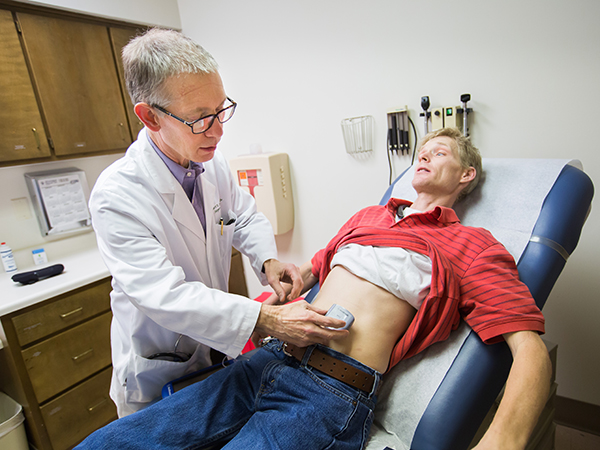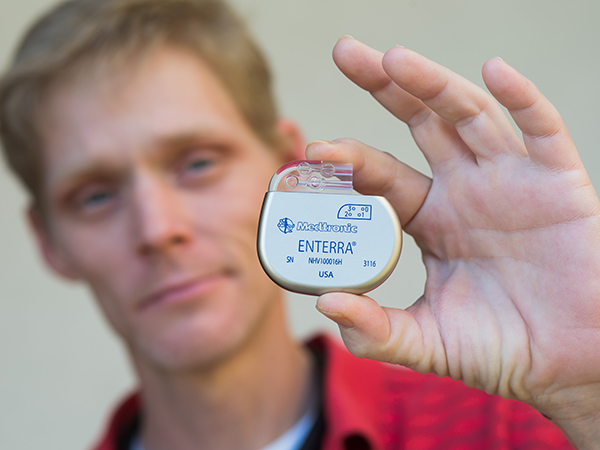Electrical device eases gastroparesis symptoms

Not two months ago, Terry Schickel coped with nausea and vomiting “just about every day of the week, all day long.”
For four years, he suffered from the disease gastroparesis, a crippling condition in which the stomach is all but paralyzed, causing it to empty very slowly. That can mean constant nausea, vomiting of undigested food, distention of the abdomen and an unwarranted feeling of fullness.
“I couldn't hold water down. Over the last four years, I've been in the ER or admitted to the hospital well over 20 times,” said Schickel, an electrician and Meridian resident.
In July 2016, Schickel heard about Dr. Hubert Spears, a surgeon at the University of Mississippi Medical Center Grenada. Spears' specialties include implanting in a patient's abdomen a gastric stimulator - much like a pacemaker - that sends small electrical pulses to the nerves and smooth muscle that line the wall of the stomach. The pulses encourage the stomach to contract, which causes it to empty.
It's not a cure, but the gastric stimulator can greatly ease symptoms and allow sufferers to regain their lives. Spears implanted Schickel's gastric stimulator March 9, and Schickel is optimistic about what the coming months will bring.
His symptoms have “probably been cut in half, for sure,” said Schickel, 36. “I stay overly full sometimes, and I'm a little nauseous on occasion. If I can get to where I only throw up once a week, I'd be happy.”
Spears is among a small handful of surgeons in Mississippi who implant gastric stimulators. Patients flock to him from the far corners of the state, plus surrounding states including Tennessee, Alabama and Arkansas. Spears has performed more than 100 of the procedures since 2015.
The device was pioneered more than two decades ago by Dr. Thomas Abell, an affiliate faculty member and former director of UMMC's Division of Digestive Diseases. Abell now is a world-recognized researcher and chair of gastroenterology in the Division of Gastroenterology, Hepatology and Nutrition at the University of Louisville.

Schickel displays a model of the gastric stimulator recently implanted in his stomach wall.
Gastroparesis “is a complex disease,” said Dr. Jim Sones, professor and chief of the Division of Digestive Diseases. “There is no cure, and it's very difficult to manage it. It's a complication of diabetes in many cases, but many times, we don't why some get it, and some don't. It's a puzzle.”
It's diagnosed by use of a nuclear medicine scan of the patient's stomach during the digestive process. “Once the patient eats the food, you can calculate how long it takes the stomach to empty,” Spears said. “For a normal person, most food is gone from the stomach in about two hours. If you have gastroparesis, it's a lot more time.”
Another way to confirm a diagnosis is through endoscopy, a non-surgical procedure used to examine a person's digestive tract using a flexible tube with a camera and light attached to it. “There will be retained food in the stomach, even though the patient didn't eat all night before the endoscope,” Spears said. “That's a tipoff that they might have gastroparesis.”
Medicinal treatment of gastroparesis often isn't a good option, Spears said. The two most common medications used to speed up stomach emptying, Motilium and Reglan, can have significant side effects.
“They do work for some people, but otherwise, you're left with general nausea medicine,” Spears said. “It doesn't usually decrease all of the symptoms. The only treatment left is the gastric stimulator.”
Patients coping with gastroparesis can be miserable. “I've had patients tell me that, and the desperation they have,” Spears said. “Most of them definitely improve with the surgery.”
The stimulator is about the size of a half-dollar. Two leads, or wires, are laparoscopically implanted in the muscular wall of the stomach so open abdominal surgery can be avoided. The wires are connected to the battery-operated stimulator, which is activated by the physician. Frequency of the pulses is adjusted as needed. The battery is good for about five years, Spears said.
The surgery is usually an outpatient procedure involving 23-hour observation, Spears said.
Schickel said he hesitated to have the surgery because he's diabetic and might not tolerate it well. “I was trying to cope with it using medication,” he said. His weight plummeted from 160 pounds to 120.
But when he ended up in the intensive care unit for the disease in February, “that's when I decided it was time,” he said. His condition was so dire that he was even hospitalized the week his surgery was scheduled, Schickel said.
Spears said the procedure is meant for patients who have unsuccessfully tried to manage their disease with either medications or lifestyle and diet modifications. He said that he learned to do the procedure after a gastroenterologist asked him to help his patients.
“He'd seen good results with the procedure, and he knew the desperation of some patients,” Spears said.
Patients will be up on their feet the first day after surgery, and then will follow directions given to those having laparoscopic procedures, such as limiting heavy lifting for a few weeks.
“Sometimes, the patient notices a good bit of improvement on the first day, but often, it's more gradual,” Spears said. “There is usually significant improvement between three and four weeks after surgery.”
Gastroparesis is “a fairly rare situation, and not something doctors see every day in their office,” Sones said. When it's diagnosed by physicians on UMMC's Jackson campus, they are referred to Spears for evaluation.
“It's the ultimate treatment when drugs fail,” Sones said. “We're very lucky to have Dr. Spears.”
The surgery is making a difference, Schickel said.
“It's not a silver bullet. It won't fix everything overnight, but over time I will have a better quality of life. I definitely can tell a difference,” Schickel said. “I can hold food down long enough to get nutrition, and I'm starting to gain some weight. I think we might be on the right path.”


